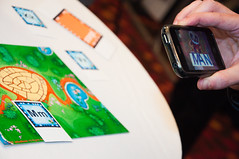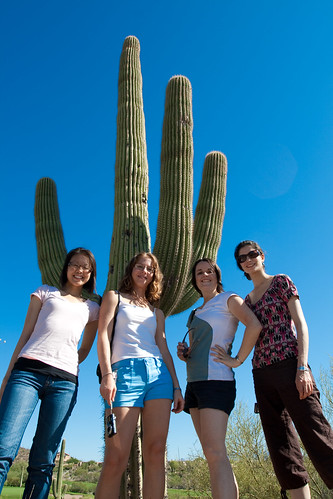This post was written by Opportunities Officer Laura Mutu.Last Tuesday I attended a CU-WISE speaker event focused on Social Media presented by Natasha D’Souza. I felt that I should attend since I am interested in exposing myself to good techniques of keeping oneself image in the virtual space, being at the verge of getting into the work force in my field.
Companies have marketing offices and human resources, but each individual only has 24 hours a day, and each of us needs to know a little bit of everything in the end to be able manage ourselves better. A lot of the communication today takes place online, and even if you think you know what it’s about, you never really understand all the consequences or all the opportunities.
What I found neat during the presentation was Natasha’s way of twisting the usual usage of a social tool, or just revamping some old technology, underused in the present.
Then, although I took good notes during her speech (without knowing I will end up writing a blog using them; you can imagine my happiness for finding them now heh), I also found the slides and a summary of her speech online.
Why I found that as neat? Well, I have a short spanning memory and it often happens that I go to workshops and create mental notes on the speaker’s slides, but then I can’t come back to review them, hence I take written notes. All that in the hopes that these talks will contribute to my growth and that it won’t just be an attended session, a check mark in my agenda, but I’ll make sure to actually absorb and check what the person was talking about.
Now, we’ll take a look at what I took out from the session, and hopefully, it will be useful for you as well.
When it comes to social bookmarking, a new way of keeping track of interesting links online, also adopted by a few of the girls present at the workshop, Natasha suggests
Diigo.
I personally use Google bookmarks, just because I like how simple and slick Google is.
As a general rule, whenever you save something, remember to register a few key words that might help you decrypt what the link/fact/person/picture was all about. We know we all think we will remember that something later, but as programmers know, it’s possible to work on heavy programs for months and then not remember anything about that little piece of code from the beginning. So, take those few more precious seconds and throw in the right words that will save you some grief later in times of need.
Some of the rules for right tagging:
- should be searchable online, if public
- create own standard of how to use it will take a while, like a couple of years, so start now!
- make documents (scientific or pdfs) relevant to target audience
Natasha encouraged us to use RSS feeds to keep up to date with events or people’s blogs that we find interesting. On the reverse note, anyone maintaining a website should consider adding social buttons so that if visitors find certain info on your website worth sharing, they can do so right away. In fact, the presence of social buttons can just click a reminder in the person’s mind that your page is available for sharing, so they get an incentive to do so.
Alongside the popular blogs and Facebook notes, why don’t you try contributing to a Wikipedia page? It’s a great activity anyone can take on actually. MediaWiki has a few tags that you need to get accustomed in the beginning, but then it’s just your speedy fingers contributing content to the international community and the wealth of knowledge. Doesn’t it look great on your resume?
Especially if you are passionate about the subject you are contributing to, it shows that you are ready to go the extra mile; that you are also a giver, not just a taker; that you can share and give back.
If you are a little software inclined, even better, because wiki itself is getting quite old and looks like it would need some review to become more automated. So, get out there and see how you can volunteer in the development of this amazing website each and one of us keeps coming back to.
Blogs are available everywhere for you to share your passions, but it’s not as easy as you thought, is it? It takes discipline and goal setting; and about a year to define your style and get comfortable to writing for the masses. As strange at it may seem in this informational boom, it seems that there are not so many Canadian tech female bloggers. So start participating, find your own pace and rhythm, your inner voice, and give HR personnel something you want them to read about you.
Also in blog formats, e-newsletters can be tag-able and provide a conversation medium. Flipping the coin on the other side, they are great opportunities for you to start conversations online about things that interest you. You can give people an idea of who you are as a person and so, generate good, professional information beyond parties for other to grasp in the cloud.
Amongst the questions of the evening there was one that kept in creeping up: “Do you use LinkedIn?”
The reason is that LinkedIn is a very powerful tool if you keep your profile up-to-date since it is feature rich ( you can add Amazon books you like, your blog, twitter, website) and you can use it to participate and generate discussions, to demonstrate your expertise and differentiate yourself in job market. Recruiters and potential employers use it, so why don’t you? Found that event interesting, go ahead and give your two cents on why you think that is so. Provide feedback to your contact database and keep in mind that any person needs to meet another person six times before they remember each other.
Hmm, wondering how Facebook can be used besides sharing pictures and checking out your friends’ friends? Why don’t you start looking for something that is really important for you, like that company you like. You can become a fan of it and even start a discussion and share your views.
There is also, of course, the universe of the microblogs, such as Twitter, where you can quickly update people on cool projects and ideas. You can also try Youtube and contribute to video sharing and make Carleton, for example, more interesting with your own input, something authentic and original that would easy the marketing’s task, and improve your image in the public community’s eyes.
Other sites mentioned included
meet-up and
bringITon.
In conclusion, you need to realize that this is a new world we’re living in and you can’t control everything, and need to take things into perspective. If you put anything out there, it will be there forever, so if you don’t want your boss to read it, don’t post it. Everything is out there for the world, regardless your false sense of privacy, and people will always judge you. In the end, you need to take the time and figure out and try to see what is good for you.
Natasha was also kind enough to invite us to “
Connect the Dots” Ottawa, an event where the various women organizations of Ottawa come together, and where she was to speak in a few days. I got to the opening evening which was really interesting and fun and all the women had a story to tell, I would highly recommend attending if you have the opportunity. You can read a lot more details about the event on their website and also on Natasha’s website:
http://www.virtualeyesee.com/























